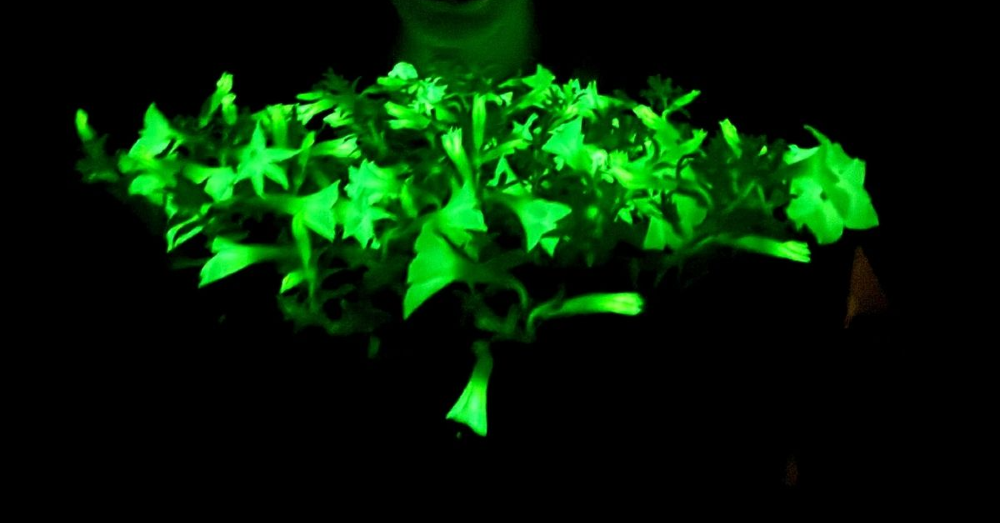
Can you enjoy your garden at night? You can if you have a patch of bioluminescent petunias in your garden. Yes, these are a real thing.
How do molecules interact with diseases? This question is what led some scientists to introduce bioluminescence into plants to see how they work within the plant. Keith Wood, Ph.D. introduced a firefly gene into a tobacco plant to learn more about how the plant might react with this gene. This was the beginning of learning how bioluminescence works and how to help plants grow that can’t sustain in sunlight without additional ingredients.
The research led to this new petunia
Science doesn’t typically move at the speed of technology, and that’s certainly the case for this new flower. Forty years after the first plant produced a glowing effect, Wood and his company have created a plant that could give any garden a special look at night. This new petunia can glow in the dark, which is something special and unique. Most people add lighting to their garden areas to provide a night glow, but these flowers can do it on their own.
Science made for personal joy
Although Dr. Wood has spent most of his life researching pharmaceuticals, this plant is another part of science. Bioluminescent petunias can bring incredible joy to our lives and play a big part in making your garden special. This plant has been modified by science, but it shows how magical things can be when the goal is to create something special and beautiful. The look is something you don’t see every day and won’t likely see in many other plants that you could have in your garden. This particular petunia has a special name and look to make it unique.
How does this petunia glow at night?
Instead of using firefly genes to create the glowing effect at night, Wood and his team used four genes from bioluminescent mushrooms and a fifth from fungi to create the glow. This combination of genes allows the petunia to glow with bright light at night. The petals begin to light up with a greenish-white glow that appears brighter at night. The newest buds glow the brightest and give the plant an added look that accentuates the glowing flowers. The glowing bugs give the plant the look of fireflies sitting on it at night.
How do the genes work to create the effect?
As Dr. Wood explains, the genes work together to create the nighttime glow that we can see and enjoy. This bioluminescent petunia looks wonderful, but there’s a lot of science going on under that glow. The first gene takes a metabolite and turns it into an intermediate, and the second takes the intermediate and turns it into actual fuel for the bioluminescence. The third gene makes the light, and the last gene takes the product from the light reaction and recycles it back to the start. This gives the plant a self-sustaining cycle, allowing the plant to glow every night.
Approval took a long time
Part of the 40 years from the glowing tobacco plant with the firefly gene to these new petunias was the ten years it took to go from development to approval from the US Department of Agriculture. This approval was finally given last fall, and these new petunias went on sale in February. Glowing petunias are a great choice for a plant for gardeners looking for the latest new plant and something that many can remember seeing in their grandmothers’ gardens while growing up.
Will gardeners enjoy this new flower?
The bioluminescent petunia has a special name that’s much easier to say. In slight reference to the first plant, but more about what fireflies do at night, this flower is called the Firefly Petunia. It should become a huge hit for people who love to plant petunias and want to enjoy a glowing flower at night.
There was some concern that gardeners might not enjoy a genetically modified plant, but Wood and his company aren’t too concerned by this. It wasn’t long ago that an orange petunia modified with a maize gene appeared in gardens across Europe and the United States. This plant wasn’t supposed to leave the lab but became a huge hit.
The new Firefly Petunia is a plant made to provide joy and happiness to anyone who plants it in their garden. This bioluminescent petunia could be the next beautiful addition to your garden; will you put it in an area where you can enjoy its glow at night?
This post may contain affiliate links, meaning we may earn a commission if you make a purchase. There is no extra cost to you. We only promote products we believe in.






